Pros & Cons of Social Logins
Social login allows users to authenticate in a website or app without needing to create another password for this new account, or having to remember this password next time they return. The process relies on the credentials from a social networking service such as Facebook, Google, Twitter or an Apple account.
Social logins not only simplify the user experience and overall satisfaction, but also benefit the organizations providing this type of authentication to their users, such as increasing sign-ups and conversions, decreasing fake accounts, and providing user account and profile data. But, like most solutions, there are distinct disadvantages that we will discuss in this article so you can make the most informed choice for your organization.
Advantages of Social Logins
Improved user experience
The user experience of a website, or an app, can completely change customer perception and lead to increased activity or abandoned accounts.
Social logins allow customers to access the system without creating another password, which causes 76% of user drop-offs at registration. This is also relevant for returning customers who don’t have to remember a new password and can easily access a service from multiple trusted devices. We should always remember the “password fatigue” that affects many customer decisions when it comes to transacting with online services.
From the point of view of users, this is also the strongest argument to use Beyond Identity, that provides an unmatched secure and seamless experience.
Mobile-friendly
It is hard to overstate the importance of online activity on mobile devices. It is not only the most used form of online access globally, but most apps and websites are focused on providing a full mobile experience.
However, mobile devices usually present some limitations like smaller screens that encumber users when it comes to typing their login and passwords. Social logins provide a simpler alternative to mobile users and, again, improve the overall experience to register and access an app or website.
With Beyond Identity developers can go one step further - taking advantage of the built-in biometric or secure PIN code, to ensure that the device owner is in possession of the device at the time of login as opposed to being logged into a social app with no timeout or expiration.
Increased data collection
Social logins are also useful for organizations that implement them in their apps and websites, providing relevant data about their users like names, email, and interests, depending on the focus of the social network provider.
Your choice of which social login(s) to integrate is important when you consider the data they may provide about your users. An app focused on a younger demographic would choose a different social login than a website for software development learning, which could rely on Github.
Reduced cart abandonment
Customers find it difficult to remember their passwords, and registration requirements to complete transactions are proven to significantly reduce conversions. Forcing users to create and remember passwords has a concrete impact on any business and creates a poor user experience.
The use of social logins takes you one step closer to ensure the conversions that your service is targeting.
Disadvantages of Social Logins
Lack of trust and consumer privacy concerns by consumers
Users are becoming more wary of social logins and online security, in general, after hearing of increasing numbers of security breaches and data leaks in the last few years. Additionally, decreased trust with how companies use their personal data has created a new hurdle when it comes to convincing your customers to use social logins. This growing lack of trust leads to lowered adoption of social logins which reduces its effectiveness in driving conversions.
Mandatory data sharing
Organizations have also become reluctant to use social logins because social network companies could gain competitive information on which users are accessing your applications, when, and how frequently. For instance, some social providers have native marketplaces which benefit from authentication data from e-commerce applications.
This is why we recommend using Beyond Identity’s passwordless authentication and learning what it is and how it works.
Blockage of social networks
Social networks may be blocked in networks like the ones used in schools and workplaces. This is also a concern if you try to service users located in countries that may limit access to different social networks.
Because of this, you will always have to offer an alternative that provides many of the benefits of social login while ensuring ubiquitous availability of your solutions and services.
Visitors forget which social login they used
Most users have accounts with most social networks, inevitably leading to them forgetting which social login was used for your website or application. Moreover, most applications and websites still allow for username and password authentication in addition to social logins. The end result will be many users will create multiple accounts negatively impacting the ease of use and losing history of their past transactions, information, and activities. On the company’s side, a single customer with multiple, disconnected accounts makes it difficult to create a single view of the customer, which leads to less effective personalization and engagement.
Too many options
Users get confused by too many choices. Plus, too many social login options creates a cluttered user interface and will make alternative login options more difficult to use. It is better to make an educated decision about the best social logins for your targeted audience and maintain a streamlined user experience.
Security issues
If the social network is hacked or banned it will make it difficult, or even impossible, for your customers to access your app or website. This will lead customers to create a new account or simply find a better option with one of your competitors.
Social login providers supply a list of all apps that use them for login to make it easy for a user to revoke access. This security feature is a target list for any bad actor who hacks a customer’s social account. Attackers can gain access to all services authenticated via that social account, which exponentially increases the security risk of a singular account breach.
This security risk is minimized when you rely on systems like Beyond Identity’s, that take advantage of your mobile device’s built-in biometric or secure PIN code.
Conclusions
Social logins can benefit the user experience when done right but the disadvantages require careful consideration prior to implementation. The good news is, with passwordless authentication, you can bypass the security risk and usability issues of social logins while increasing conversions at registration, login, and recovery. Plus, going passwordless can exist alongside social login options so you can give your customers the flexibility to choose what’s right for them now and in the future.
Beyond Identity Secure Customers replaces passwords with unphishable multi-factor authentication (MFA) that is invisible to your customers. With an innovative implementation of asymmetric cryptography in combination with built-in device biometrics, Secure Customers eliminates account takeover fraud while keeping authentication frictionless across both native mobile and web applications with no one-time codes, push notifications, or second devices required.
Learn more
Social login allows users to authenticate in a website or app without needing to create another password for this new account, or having to remember this password next time they return. The process relies on the credentials from a social networking service such as Facebook, Google, Twitter or an Apple account.
Social logins not only simplify the user experience and overall satisfaction, but also benefit the organizations providing this type of authentication to their users, such as increasing sign-ups and conversions, decreasing fake accounts, and providing user account and profile data. But, like most solutions, there are distinct disadvantages that we will discuss in this article so you can make the most informed choice for your organization.
Advantages of Social Logins
Improved user experience
The user experience of a website, or an app, can completely change customer perception and lead to increased activity or abandoned accounts.
Social logins allow customers to access the system without creating another password, which causes 76% of user drop-offs at registration. This is also relevant for returning customers who don’t have to remember a new password and can easily access a service from multiple trusted devices. We should always remember the “password fatigue” that affects many customer decisions when it comes to transacting with online services.
From the point of view of users, this is also the strongest argument to use Beyond Identity, that provides an unmatched secure and seamless experience.
Mobile-friendly
It is hard to overstate the importance of online activity on mobile devices. It is not only the most used form of online access globally, but most apps and websites are focused on providing a full mobile experience.
However, mobile devices usually present some limitations like smaller screens that encumber users when it comes to typing their login and passwords. Social logins provide a simpler alternative to mobile users and, again, improve the overall experience to register and access an app or website.
With Beyond Identity developers can go one step further - taking advantage of the built-in biometric or secure PIN code, to ensure that the device owner is in possession of the device at the time of login as opposed to being logged into a social app with no timeout or expiration.
Increased data collection
Social logins are also useful for organizations that implement them in their apps and websites, providing relevant data about their users like names, email, and interests, depending on the focus of the social network provider.
Your choice of which social login(s) to integrate is important when you consider the data they may provide about your users. An app focused on a younger demographic would choose a different social login than a website for software development learning, which could rely on Github.
Reduced cart abandonment
Customers find it difficult to remember their passwords, and registration requirements to complete transactions are proven to significantly reduce conversions. Forcing users to create and remember passwords has a concrete impact on any business and creates a poor user experience.
The use of social logins takes you one step closer to ensure the conversions that your service is targeting.
Disadvantages of Social Logins
Lack of trust and consumer privacy concerns by consumers
Users are becoming more wary of social logins and online security, in general, after hearing of increasing numbers of security breaches and data leaks in the last few years. Additionally, decreased trust with how companies use their personal data has created a new hurdle when it comes to convincing your customers to use social logins. This growing lack of trust leads to lowered adoption of social logins which reduces its effectiveness in driving conversions.
Mandatory data sharing
Organizations have also become reluctant to use social logins because social network companies could gain competitive information on which users are accessing your applications, when, and how frequently. For instance, some social providers have native marketplaces which benefit from authentication data from e-commerce applications.
This is why we recommend using Beyond Identity’s passwordless authentication and learning what it is and how it works.
Blockage of social networks
Social networks may be blocked in networks like the ones used in schools and workplaces. This is also a concern if you try to service users located in countries that may limit access to different social networks.
Because of this, you will always have to offer an alternative that provides many of the benefits of social login while ensuring ubiquitous availability of your solutions and services.
Visitors forget which social login they used
Most users have accounts with most social networks, inevitably leading to them forgetting which social login was used for your website or application. Moreover, most applications and websites still allow for username and password authentication in addition to social logins. The end result will be many users will create multiple accounts negatively impacting the ease of use and losing history of their past transactions, information, and activities. On the company’s side, a single customer with multiple, disconnected accounts makes it difficult to create a single view of the customer, which leads to less effective personalization and engagement.
Too many options
Users get confused by too many choices. Plus, too many social login options creates a cluttered user interface and will make alternative login options more difficult to use. It is better to make an educated decision about the best social logins for your targeted audience and maintain a streamlined user experience.
Security issues
If the social network is hacked or banned it will make it difficult, or even impossible, for your customers to access your app or website. This will lead customers to create a new account or simply find a better option with one of your competitors.
Social login providers supply a list of all apps that use them for login to make it easy for a user to revoke access. This security feature is a target list for any bad actor who hacks a customer’s social account. Attackers can gain access to all services authenticated via that social account, which exponentially increases the security risk of a singular account breach.
This security risk is minimized when you rely on systems like Beyond Identity’s, that take advantage of your mobile device’s built-in biometric or secure PIN code.
Conclusions
Social logins can benefit the user experience when done right but the disadvantages require careful consideration prior to implementation. The good news is, with passwordless authentication, you can bypass the security risk and usability issues of social logins while increasing conversions at registration, login, and recovery. Plus, going passwordless can exist alongside social login options so you can give your customers the flexibility to choose what’s right for them now and in the future.
Beyond Identity Secure Customers replaces passwords with unphishable multi-factor authentication (MFA) that is invisible to your customers. With an innovative implementation of asymmetric cryptography in combination with built-in device biometrics, Secure Customers eliminates account takeover fraud while keeping authentication frictionless across both native mobile and web applications with no one-time codes, push notifications, or second devices required.
Learn more
Social login allows users to authenticate in a website or app without needing to create another password for this new account, or having to remember this password next time they return. The process relies on the credentials from a social networking service such as Facebook, Google, Twitter or an Apple account.
Social logins not only simplify the user experience and overall satisfaction, but also benefit the organizations providing this type of authentication to their users, such as increasing sign-ups and conversions, decreasing fake accounts, and providing user account and profile data. But, like most solutions, there are distinct disadvantages that we will discuss in this article so you can make the most informed choice for your organization.
Advantages of Social Logins
Improved user experience
The user experience of a website, or an app, can completely change customer perception and lead to increased activity or abandoned accounts.
Social logins allow customers to access the system without creating another password, which causes 76% of user drop-offs at registration. This is also relevant for returning customers who don’t have to remember a new password and can easily access a service from multiple trusted devices. We should always remember the “password fatigue” that affects many customer decisions when it comes to transacting with online services.
From the point of view of users, this is also the strongest argument to use Beyond Identity, that provides an unmatched secure and seamless experience.
Mobile-friendly
It is hard to overstate the importance of online activity on mobile devices. It is not only the most used form of online access globally, but most apps and websites are focused on providing a full mobile experience.
However, mobile devices usually present some limitations like smaller screens that encumber users when it comes to typing their login and passwords. Social logins provide a simpler alternative to mobile users and, again, improve the overall experience to register and access an app or website.
With Beyond Identity developers can go one step further - taking advantage of the built-in biometric or secure PIN code, to ensure that the device owner is in possession of the device at the time of login as opposed to being logged into a social app with no timeout or expiration.
Increased data collection
Social logins are also useful for organizations that implement them in their apps and websites, providing relevant data about their users like names, email, and interests, depending on the focus of the social network provider.
Your choice of which social login(s) to integrate is important when you consider the data they may provide about your users. An app focused on a younger demographic would choose a different social login than a website for software development learning, which could rely on Github.
Reduced cart abandonment
Customers find it difficult to remember their passwords, and registration requirements to complete transactions are proven to significantly reduce conversions. Forcing users to create and remember passwords has a concrete impact on any business and creates a poor user experience.
The use of social logins takes you one step closer to ensure the conversions that your service is targeting.
Disadvantages of Social Logins
Lack of trust and consumer privacy concerns by consumers
Users are becoming more wary of social logins and online security, in general, after hearing of increasing numbers of security breaches and data leaks in the last few years. Additionally, decreased trust with how companies use their personal data has created a new hurdle when it comes to convincing your customers to use social logins. This growing lack of trust leads to lowered adoption of social logins which reduces its effectiveness in driving conversions.
Mandatory data sharing
Organizations have also become reluctant to use social logins because social network companies could gain competitive information on which users are accessing your applications, when, and how frequently. For instance, some social providers have native marketplaces which benefit from authentication data from e-commerce applications.
This is why we recommend using Beyond Identity’s passwordless authentication and learning what it is and how it works.
Blockage of social networks
Social networks may be blocked in networks like the ones used in schools and workplaces. This is also a concern if you try to service users located in countries that may limit access to different social networks.
Because of this, you will always have to offer an alternative that provides many of the benefits of social login while ensuring ubiquitous availability of your solutions and services.
Visitors forget which social login they used
Most users have accounts with most social networks, inevitably leading to them forgetting which social login was used for your website or application. Moreover, most applications and websites still allow for username and password authentication in addition to social logins. The end result will be many users will create multiple accounts negatively impacting the ease of use and losing history of their past transactions, information, and activities. On the company’s side, a single customer with multiple, disconnected accounts makes it difficult to create a single view of the customer, which leads to less effective personalization and engagement.
Too many options
Users get confused by too many choices. Plus, too many social login options creates a cluttered user interface and will make alternative login options more difficult to use. It is better to make an educated decision about the best social logins for your targeted audience and maintain a streamlined user experience.
Security issues
If the social network is hacked or banned it will make it difficult, or even impossible, for your customers to access your app or website. This will lead customers to create a new account or simply find a better option with one of your competitors.
Social login providers supply a list of all apps that use them for login to make it easy for a user to revoke access. This security feature is a target list for any bad actor who hacks a customer’s social account. Attackers can gain access to all services authenticated via that social account, which exponentially increases the security risk of a singular account breach.
This security risk is minimized when you rely on systems like Beyond Identity’s, that take advantage of your mobile device’s built-in biometric or secure PIN code.
Conclusions
Social logins can benefit the user experience when done right but the disadvantages require careful consideration prior to implementation. The good news is, with passwordless authentication, you can bypass the security risk and usability issues of social logins while increasing conversions at registration, login, and recovery. Plus, going passwordless can exist alongside social login options so you can give your customers the flexibility to choose what’s right for them now and in the future.
Beyond Identity Secure Customers replaces passwords with unphishable multi-factor authentication (MFA) that is invisible to your customers. With an innovative implementation of asymmetric cryptography in combination with built-in device biometrics, Secure Customers eliminates account takeover fraud while keeping authentication frictionless across both native mobile and web applications with no one-time codes, push notifications, or second devices required.
Learn more








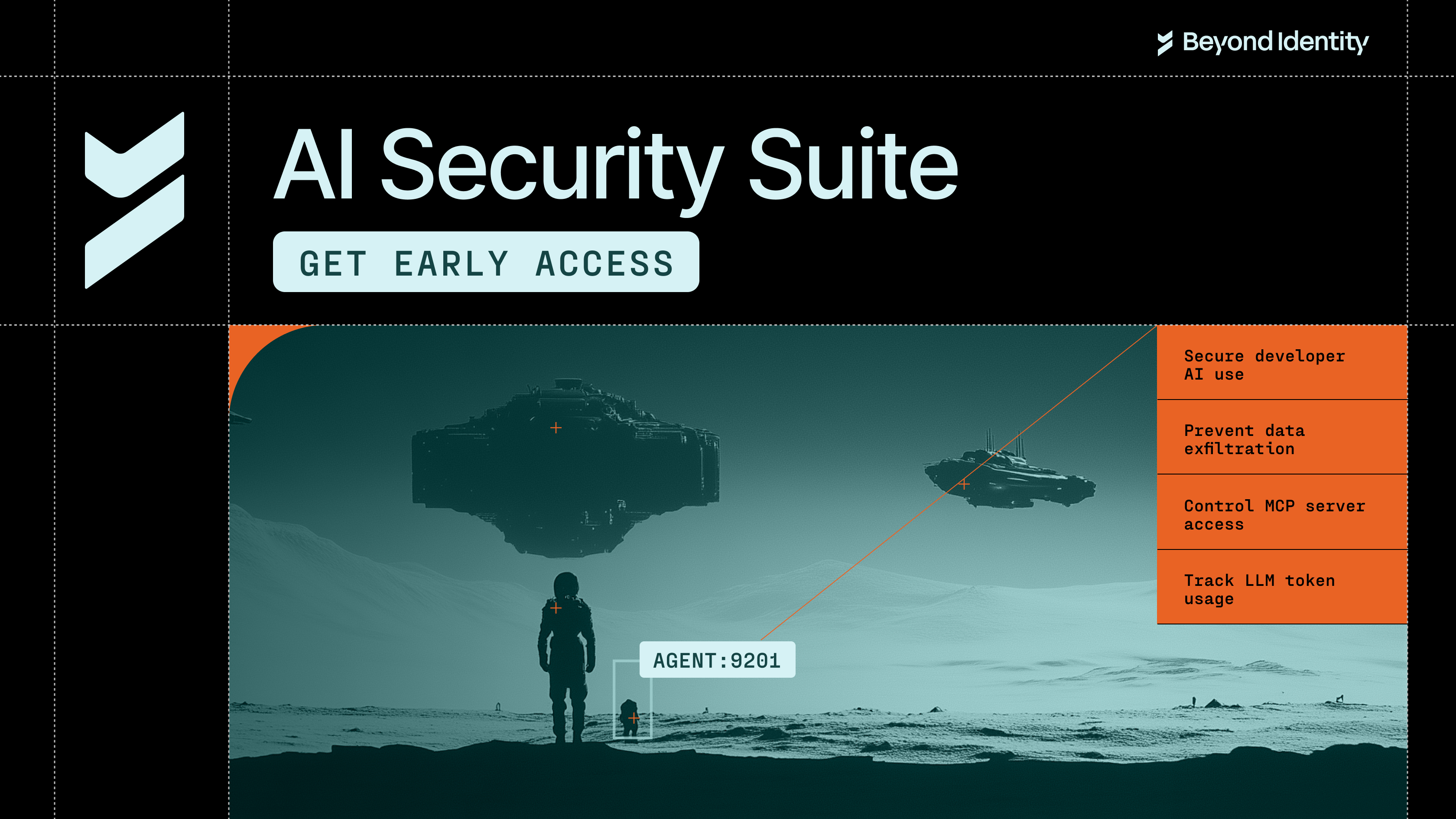
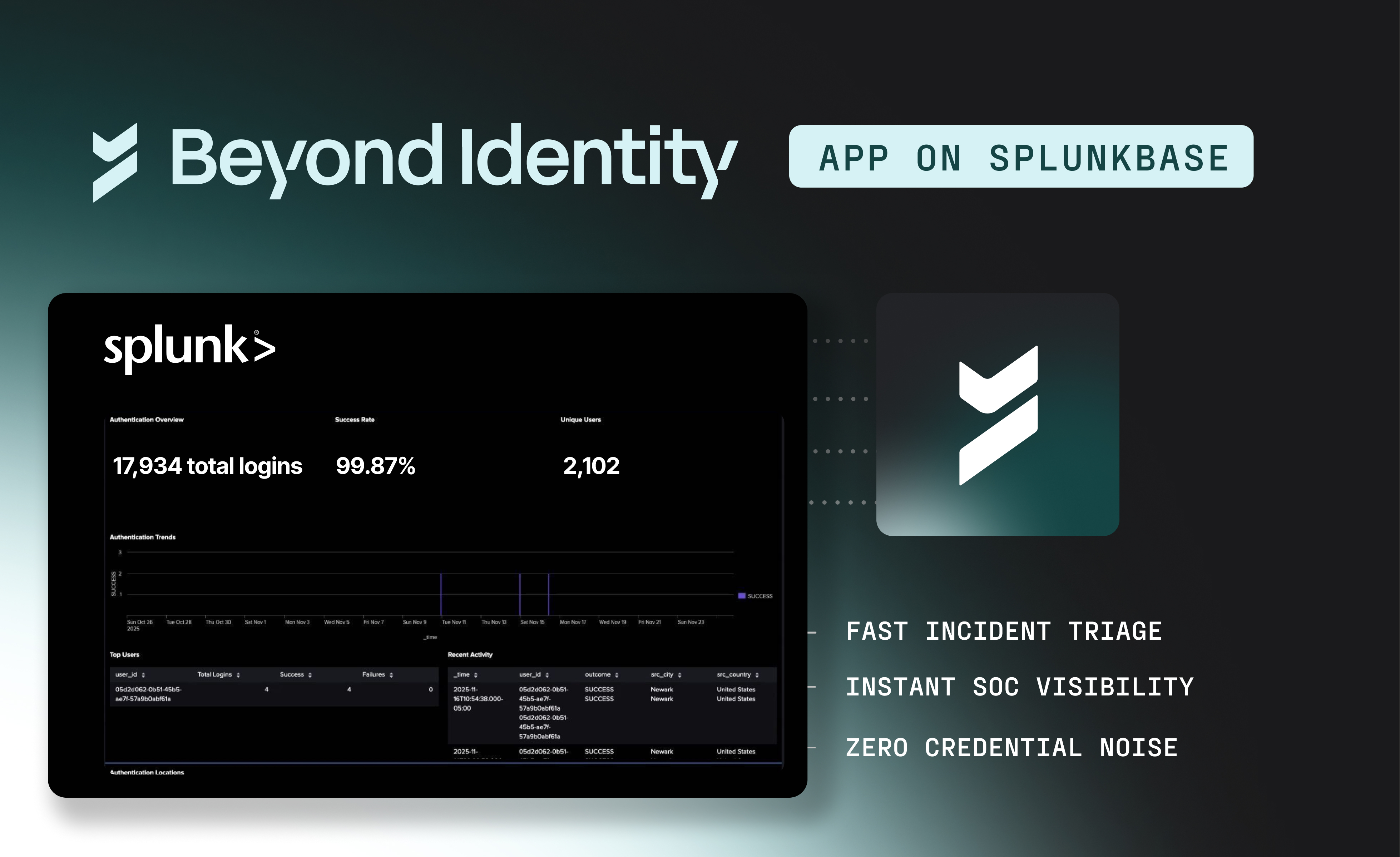
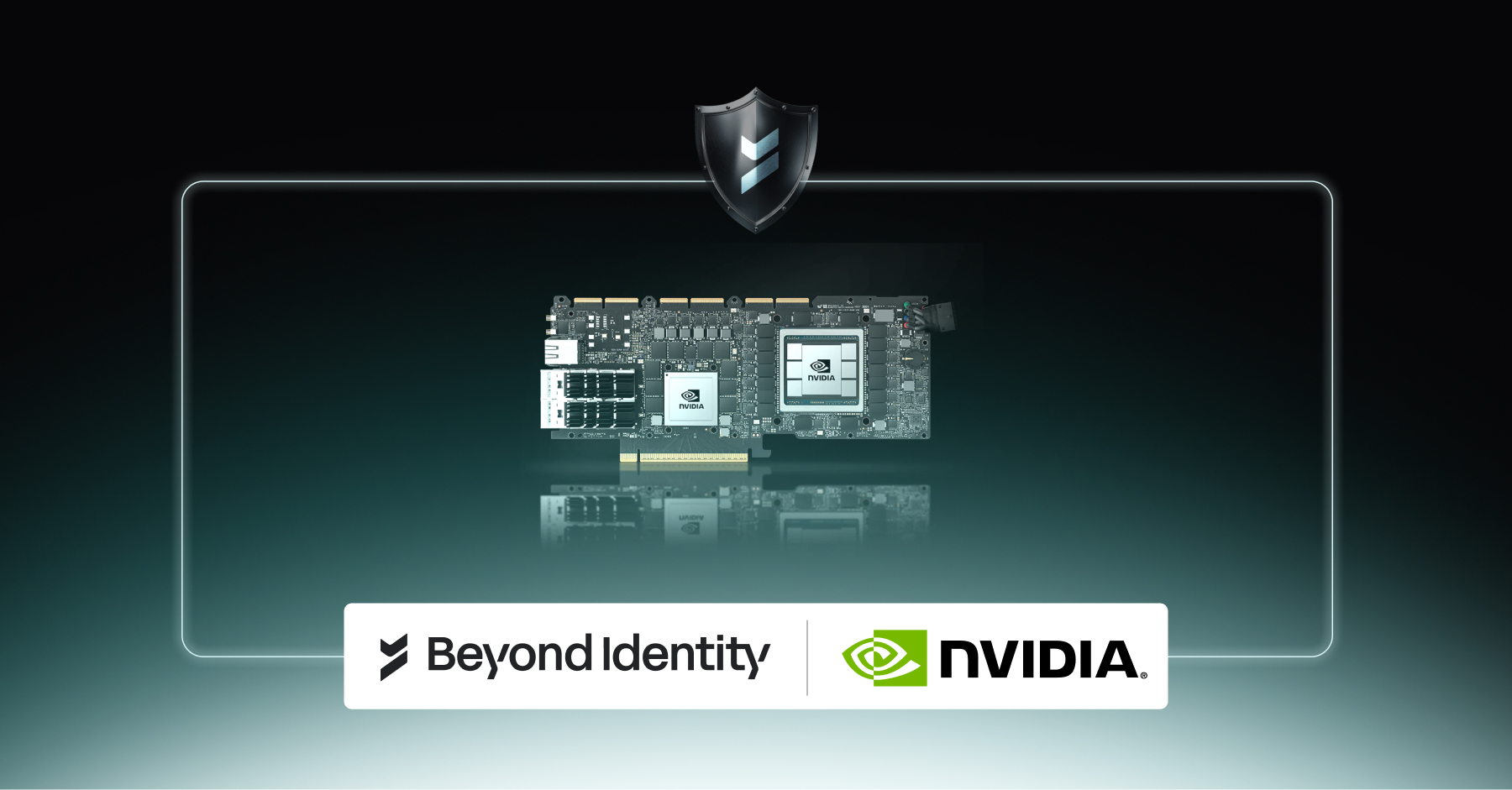


.avif)
.avif)
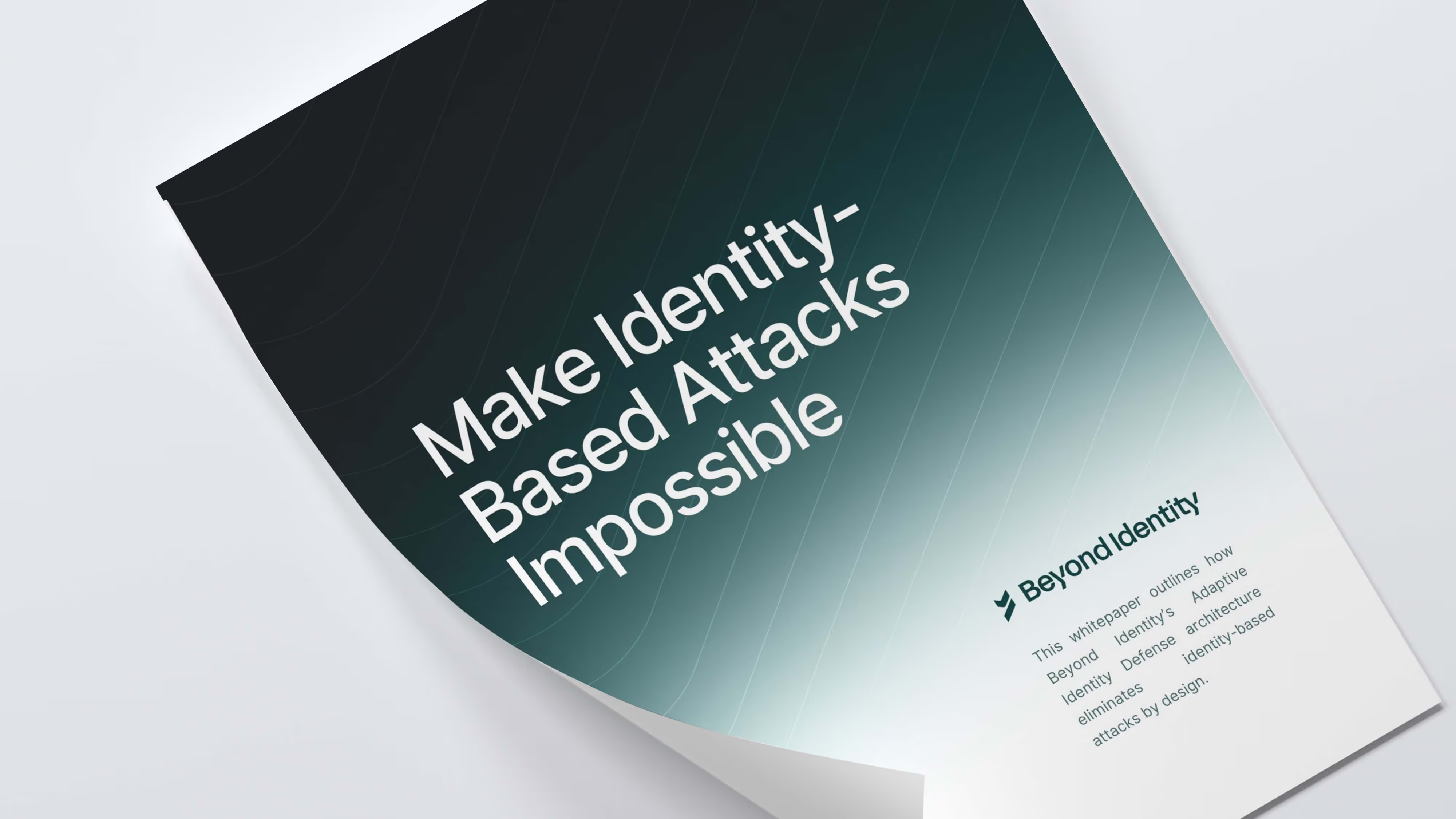
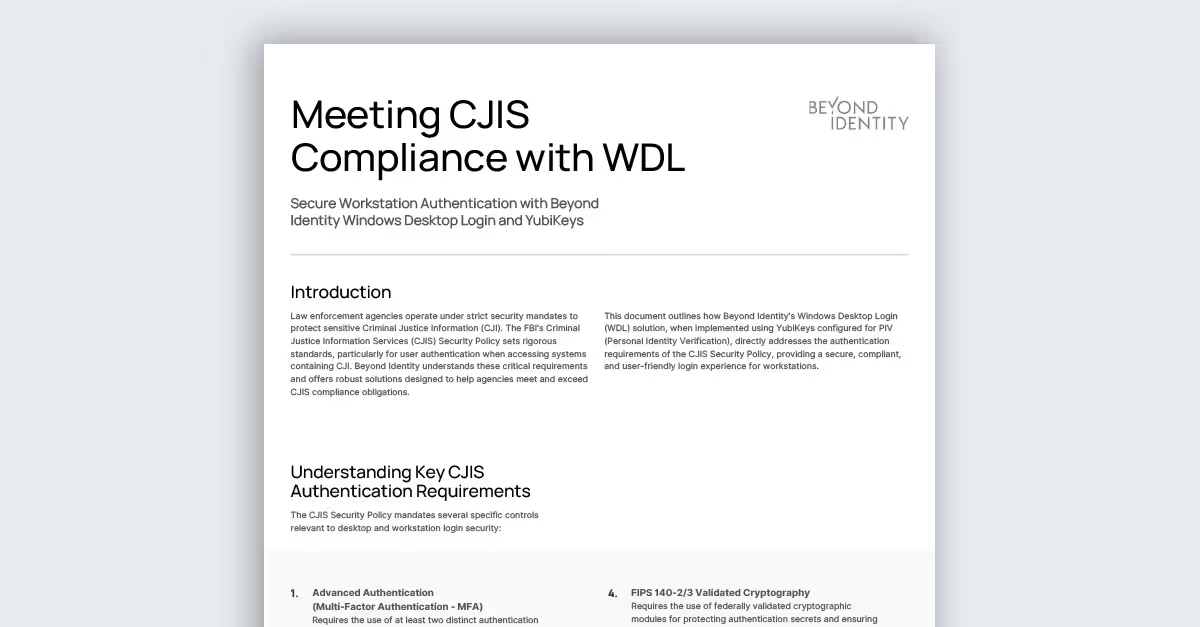
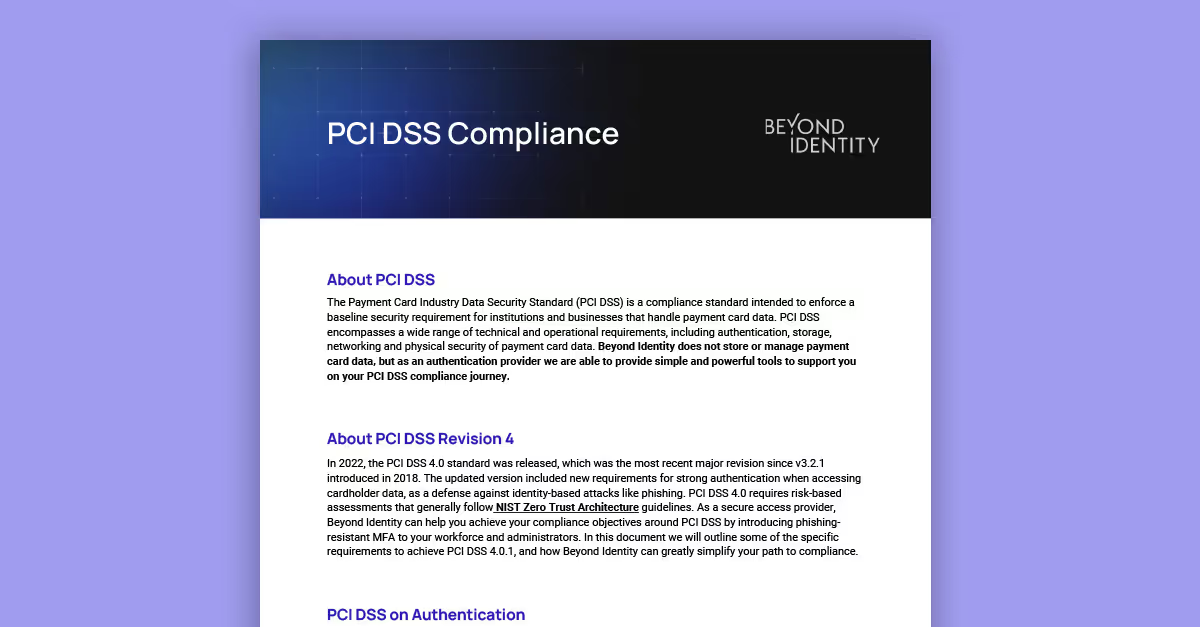
.avif)

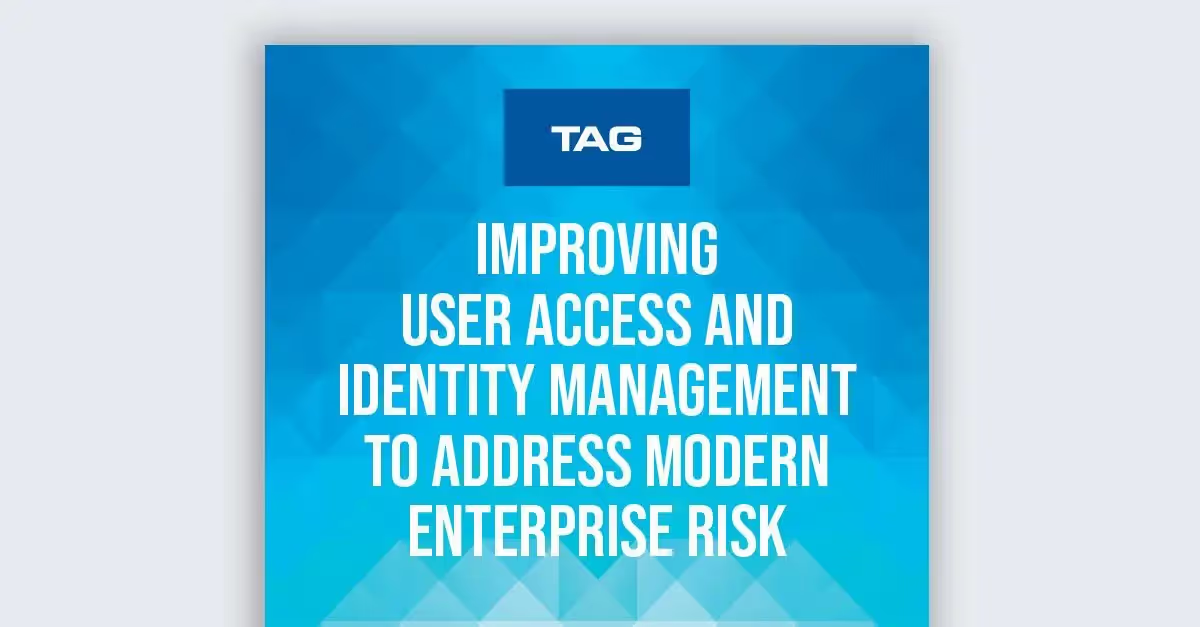

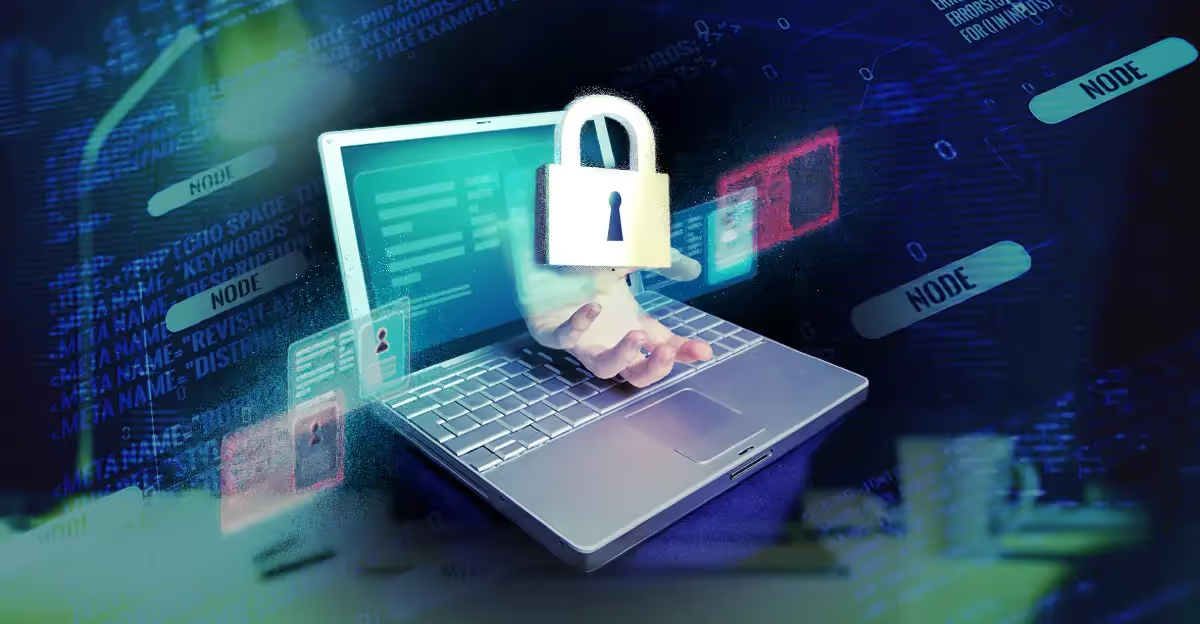


.avif)

